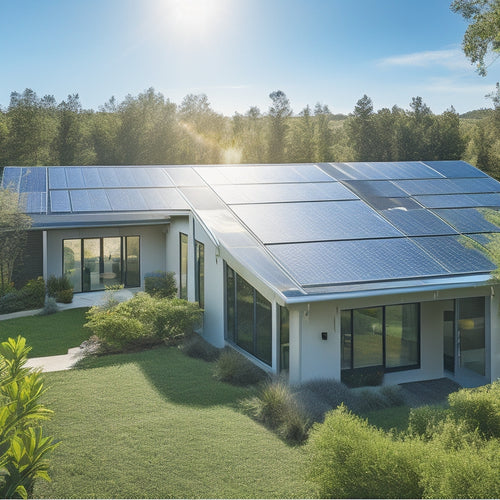
Purchase Solar Panels for Home
Share
When purchasing solar panels for your home, you can expect significant financial benefits, including zero energy bills and lower energy costs. Solar panels can increase your property value by up to 17% and provide a fast return on investment. With efficient energy conversion rates above 20%, you'll maximize your energy output. Make certain to check the wattage and voltage requirements to guarantee a safe and functional installation. By switching to solar power, you'll reduce your carbon footprint and contribute to a healthier environment. As you investigate the world of solar panels, you'll uncover more advantages and subtleties to optimize your investment.
The Essentials
- Solar panels can significantly lower energy bills, with potential long-term savings and a payback period of 5-7 years.
- Installing solar panels can increase property value by up to 17%, making homes more attractive to potential buyers.
- Solar panels provide an efficient energy conversion rate, with high energy output rates and maximum power conversion for optimal performance.
- It's essential to consider technical factors, including wattage and voltage, energy needs assessment, and system voltage requirements, for a successful installation.
- Solar panels offer an eco-friendly energy source, reducing carbon footprint and promoting a sustainable lifestyle through clean, renewable energy generation.
Zero Energy Bills Possible
You can considerably lower your energy costs by utilizing solar power, which means you'll save money now and in the long run.
By investing in solar panels, you'll not only reduce your electricity bills but also contribute to a healthier environment for future generations.
With solar panels, you'll generate free electricity during the day, reducing your reliance on the grid and slashing your energy bills.
Lower Energy Costs
As homeowners invest in solar panels, they often do so with the expectation of greatly reducing their energy expenses. With solar panels, you can notably lower your energy costs and even eliminate them entirely. By utilizing renewable resources, you're not only reducing your reliance on the grid but also increasing your energy efficiency.
Here's a breakdown of how much you can save:
| System Size | Monthly Savings | Annual Savings |
|---|---|---|
| 3 kW | $100-$150 | $1,200-$1,800 |
| 5 kW | $167-$250 | $2,004-$3,000 |
| 10 kW | $333-$500 | $3,996-$6,000 |
Save Money Now
Solar panels can completely eliminate your energy bills, a prospect that's increasingly becoming a reality for many homeowners.
You'll no longer be held hostage by rising electricity rates, and the freedom from relying on the grid is incredibly liberating. With solar panels, you'll generate your own clean energy, reducing your reliance on fossil fuels and slashing your carbon footprint.
By installing rooftop solar panels, you'll not only save money but also increase your home's value and appeal, making it a more attractive selling point should you decide to move photovoltaic modules.
Government incentives and solar financing options make going solar more accessible than ever. You can take advantage of tax credits, rebates, and low-interest loans to offset the initial investment in your solar panel system.
This means you can start saving money now, without breaking the bank. In fact, solar panels can pay for themselves in as little as 5-7 years, depending on your energy usage and local incentives.
After that, you'll enjoy zero energy bills and a significant increase in your property value.
Increases Property Value Fast
You'll find that installing solar panels on your home elevates its resale value, making it more attractive to potential buyers in the future.
In fact, a study has shown that residential solar panels can increase property value by up to 17%.
Additionally, solar panels enhance your home's curb appeal, setting it apart from neighboring properties.
Boosts Resale Value
Frequently, homeowners considering solar panels wonder if they'll recoup their investment when selling their property. The good news is that solar panels can greatly enhance your home's resale value. According to the National Renewable Energy Laboratory, solar panels can increase your property value by up to $15,000. This increase in value is due to the numerous solar panel benefits, including reduced energy costs, environmental sustainability, and increased energy independence.
As a homeowner, you're making a smart home investment by installing solar panels. Not only will you enjoy lower energy bills while you live in the house, but you'll also reap the financial rewards when you sell.
A study by the Appraisal Institute found that solar panels can increase your home's value by 3-5%. This means that if your home is worth $200,000, solar panels could add $6,000 to $10,000 to its value.
Enhances Curb Appeal
Installing solar panels on your home's roof can instantly improve its curb appeal, making it more attractive to potential buyers and increasing its property value quickly. This is because solar panels have aesthetic benefits that can enhance your home's exterior design.
Modern solar panels are designed to be sleek and slim, blending seamlessly with your roof's design. They come in various colors and styles, allowing you to choose the ones that complement your home's exterior. In fact, some solar panels are designed to mimic the look of traditional roofing materials, making them nearly indistinguishable from the rest of your roof.
The solar aesthetics of your home can greatly impact its resale value. A study by the National Renewable Energy Laboratory found that solar panels can increase your property value by up to $15,000. This is because potential buyers are willing to pay a premium for homes that are equipped with solar panels, as they recognize the long-term savings and environmental benefits they provide.
Efficient Energy Conversion Rate
When you invest in solar panels for your home, you'll want to maximize your energy harvest. This means opting for panels with a high energy output rate, typically measured in watts per hour.
High-efficiency solar panels, such as those with silicon photovoltaic cells, can achieve higher energy conversion rates, resulting in more power for your home. Look for panels that can achieve maximum power conversion, ensuring you get the most out of the sun's energy.
High Energy Output Rate
Your solar panel system's energy output rate is an essential factor in determining its overall performance. It measures how efficiently your solar panels convert sunlight into usable electricity. A high energy output rate means you'll generate more power from the same amount of sunlight, saving you money on your energy bills and reducing your carbon footprint.
When it comes to enhancing energy output, solar panel efficiency plays an important role. Look for solar panels with high efficiency ratings, typically above 20%. This guarantees that more sunlight is converted into electricity, resulting in a higher energy output rate.
Additionally, consider the panel's temperature coefficient, as high temperatures can reduce energy output. A lower temperature coefficient means your solar panels will perform better in hot weather conditions.
To maximize energy output improvement, consider the panel's orientation, tilt, and shading. Proper installation can greatly impact your energy output rate. Confirm your solar panels are installed at an ideal angle and direction to capture the most sunlight.
Maximum Power Conversion
Utilizing maximum power conversion from your solar panels is crucial to achieving an efficient energy conversion rate. You want to confirm that the energy captured from the sun is converted into usable electricity with minimal losses.
Maximum power conversion is critical to achieving maximum efficiency, which is measured by the ratio of output power to input power. A higher conversion rate means more electricity is generated from the same amount of sunlight, reducing your reliance on the grid and increasing your energy independence.
To optimize performance, look for solar panels with high conversion efficiencies, typically above 20%. These panels are designed to minimize energy losses and maximize energy output.
Additionally, consider inverters with advanced maximum power point tracking (MPPT) algorithms, which continuously monitor and adjust the panel's operating point to confirm maximum energy extraction.
Check Wattage and Voltage
You'll need to guarantee your solar panel system meets your home's voltage requirements, typically ranging from 12 to 48 volts.
During an energy audit, it's crucial to assess your energy needs and identify areas of improvement.
Within this range, you'll want to determine the ideal wattage for your system, which depends on factors like your energy needs and available roof space.
Aiming for the right wattage will help you maximize energy production and efficiency.
System Voltage Requirements
The electrical panel in your home is the central hub that distributes power to various circuits, and it's vital to determine the system voltage requirements to guarantee a safe and efficient solar panel installation.
You need to confirm that your solar panel system matches your home's electrical system voltage. The two primary system types are 120/240-volt systems, which are common in residential areas, and 208-volt systems, typically used in commercial settings.
When selecting a solar panel system, it's important to take into account the installation guidelines for your specific system type. For instance, a 240-volt system requires a compatible inverter and electrical panel configuration.
Failure to match the system voltage can lead to safety hazards, reduced efficiency, and even system failure. You should consult with a licensed electrician or solar panel professional to determine the correct system voltage requirements for your home.
They'll assess your electrical panel and recommend the suitable system configuration, confirming a safe and efficient solar panel installation that meets your energy needs.
Optimal Wattage Range
How much power do your solar panels need to generate to meet your energy needs? This is a critical question to answer when determining the ideal wattage range for your solar panel system. The wattage range you require depends on your energy needs, which vary depending on the size of your home, the number of occupants, and your energy usage patterns.
To give you a better understanding, here is a rough estimate of the ideal wattage range for different solar panel sizes:
| Solar Panel Size | Ideal Wattage Range |
|---|---|
| Small (1-2 kW) | 200-400 watts |
| Medium (2-5 kW) | 400-800 watts |
| Large (5-10 kW) | 800-1600 watts |
| Extra Large (10+ kW) | 1600+ watts |
Keep in mind that these are rough estimates, and your specific energy needs may vary. It is crucial to consult with a solar panel professional to determine the ideal wattage range for your specific situation. They can assess your energy needs and recommend the most suitable solar panel size and wattage range for your home.
Lower Carbon Footprint Guaranteed
You'll greatly reduce your reliance on fossil fuels by switching to solar power, which is an eco-friendly energy source that produces no emissions or pollution.
With solar panels, you'll generate clean energy that's gentle on the environment, reducing your carbon footprint and contributing to a healthier planet.
Eco-Friendly Energy Source
Switching to solar panels for home can greatly reduce your reliance on fossil fuels, thereby slashing your carbon footprint.
This change is essential in the modern era, where the negative impact of climate change is becoming increasingly apparent. By utilizing the power of the sun, you'll be generating clean, renewable energy that's sustainable and eco-friendly.
As you adopt solar panels, you'll be contributing to a cleaner environment and reducing your dependence on non-renewable energy sources.
This move towards renewable technology won't only benefit the planet but also provide you with a sense of freedom from the constraints of traditional energy suppliers.
You'll have more control over your energy consumption and costs, allowing you to live a more sustainable lifestyle.
Frequently Asked Questions
Can I Install Solar Panels on a Rented Property?
You'll need to review your lease agreements to determine if installing solar panels is allowed, as tenant rights vary; if permitted, you may be able to negotiate with your landlord to share the benefits.
Do Solar Panels Work During Power Outages?
"When in doubt, turn to the sun" - and that's exactly what you'll do during power outages if you have a solar battery backup system. Without a grid connection, your solar panels will continue to generate power, ensuring your independence and freedom from the grid.
How Often Should I Clean My Solar Panels?
You should clean your solar panels every 6-12 months, depending on environmental factors, to guarantee ideal energy production. Regular solar panel maintenance involves gentle cleaning techniques, such as soft-bristled brushes and deionized water, to remove dirt and debris.
Are Solar Panels Resistant to Extreme Weather?
You'll find that solar panels are designed to withstand extreme weather conditions, ensuring their durability isn't compromised; they can resist heavy rain, hail, and strong winds, minimizing weather impact on their performance and longevity.
Can I Expand My Solar Panel System Later?
Crafting a customizable clean energy configuration, you can comfortably contemplate capacity increases, as most systems are designed for seamless future upgrades, allowing you to scale up your system capacity as your energy needs evolve.
Final Thoughts
By utilizing the power of solar energy, you're not just slashing your utility bills, you're investing in a sustainable future. As you bask in the radiance of renewable energy, your property's value soars, and your carbon footprint dwindles. With efficient energy conversion rates, you're one step closer to energy independence. By checking wattage and voltage, you're ensuring a seamless shift to a greener tomorrow. Accept the solar revolution, and let the sun shine bright on your eco-friendly efforts.
Related Posts
-

Top Portable Refrigerators for Camping Adventures
When you're camping, having a reliable portable refrigerator can make all the difference for keeping your food fresh ...
-

Why Outdoor Solar Lighting Systems Are Sustainable
Outdoor solar lighting systems are sustainable because they utilize renewable energy, drastically reducing your carbo...
-

Installing Metal Solar Roofs for Maximum Energy Efficiency
Installing metal solar roofs can drastically enhance your home's energy efficiency and durability. These roofs withst...


